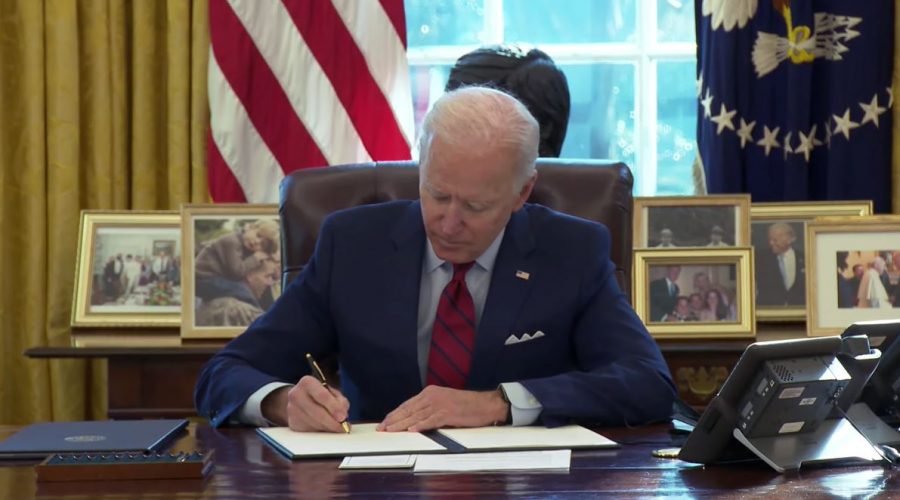Biden Signs Executive Orders
Biden signs an executive order related to the Affordable Care Act.
As the world watches, the new Biden-Harris administration races to keep its promises.
President Joseph Biden has signed over 50 executive orders in his first two months in office, ten more than were signed by the previous three presidents in the same period. Many of them reverse orders signed by former President Donald Trump during his presidency, while others guide the country’s response to the COVID-19 pandemic, change immigration policy, or work to strengthen the economy.
Executive orders are not pieces of legislation, and therefore do not need to be approved by Congress. Because of this, they can be signed and immediately put into action. Although executive orders allow a president to push changes through quickly, they can be undone just as quickly by subsequent legislation or executive orders.
A debate that emerged during the pandemic is limiting the virus’ entry into the United States via immigration. Nine out of eleven immigration-related executive orders signed by Mr. Biden have reversed Trump’s policies. Last year, Trump enacted multiple policies to limit legal immigration in response to the pandemic. These included halting the application process for many non-American green card applicants and cancelling routine visa appointments. Mr. Biden’s orders stop federal funding for the border wall, revoke Trump’s order justifying separating families at the border, and create a task force to reunite separated families.
Nearly one-third of the executive orders signed by Mr. Biden respond to the pandemic. One such directive establishes a mask mandate in federal buildings and on federal lands, airplanes, and inter-state transportation. Another order stops the country’s withdrawal from the World Health Organization (WHO) and appoints Dr. Anthony Fauci, director of the U.S. National Institute of Allergy and Infectious Diseases and the chief medical advisor to the President, as the head of the delegation to the organization. Continuing to slow the spread of the virus while citizens receive vaccinations will likely be one of the Biden administration’s most important undertakings.
Additionally, Mr. Biden’s decision to rejoin the Paris Climate Accord, an international agreement to mitigate climate change, directly overrules the Trump administration’s policies. Mr. Biden has also tasked the director of the Office of Science and Technology Policy with maintaining scientific integrity in federal agencies.
Mr. Biden has also established a White House Gender Policy Council and signed executive orders preventing discrimination on the basis of sexual orientation or gender identity in schools and workplaces.
Since being sworn into office, Mr. Biden has rolled back many COVID-related immigration restrictions, including increasing the numbers of asylum seekers admitted to pre-Trump administration levels. Walker Perrenoud ’22, a board member of the Hotchkiss Republicans Club, said, “The U.S. has had severely worse numbers than Mexico, the nation which we mainly receive immigrants from, so I didn’t agree with President Trump’s choice to suspend immigration. Getting immigration back up and running is a good sign that Biden plans to continue as normal when the pandemic is over.”
Some students believe the record numbers of executive actions taken by the Biden administration are inadequate. Grace Helm ’21, co-head of the Hotchkiss Political Union, said, “The Biden administration did sign an executive order supporting the reopening of schools, but I would have liked to see more support from the media and continued advocacy from the administration. In my opinion, getting kids back in school is one of our most pressing issues.”





